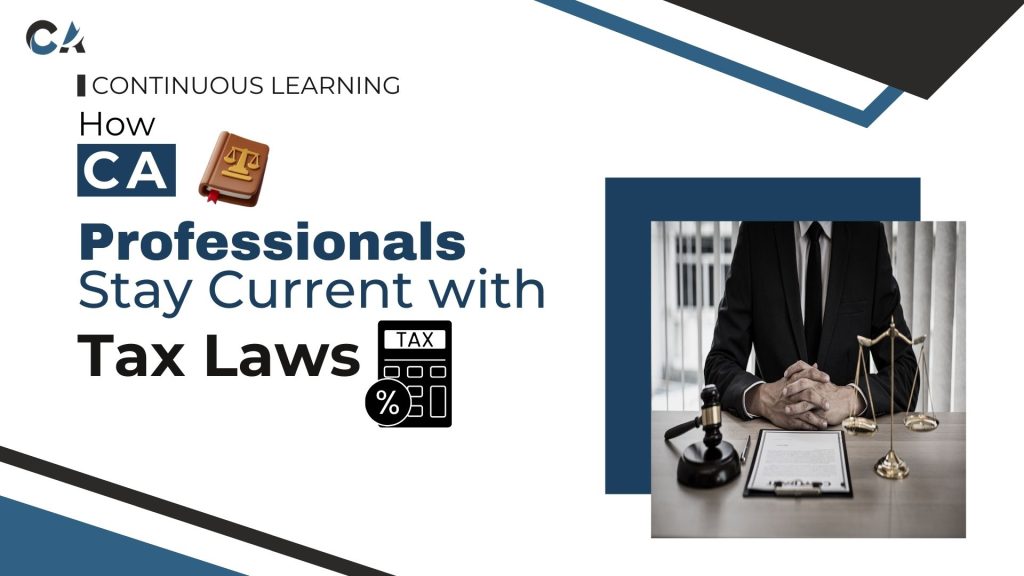Continuous Learning: How CA Professionals Stay Current with Tax Laws
In the realm of finance and taxation, staying updated with the latest laws and regulations is not just a professional requirement but a strategic necessity. For Chartered Accountants (CAs) in India, continuous learning plays a pivotal role in ensuring they provide accurate, informed, and effective guidance to their clients. This blog delves into the importance of continuous learning for CA professionals, the strategies they employ to stay current with tax laws, and the benefits of maintaining ongoing professional development.
Importance of Continuous Learning in Taxation
Continuous learning is integral to the role of a CA, particularly in the dynamic field of taxation. It involves the ongoing process of acquiring and updating knowledge and skills related to tax laws, policies, and practices. Here’s why continuous learning is crucial:
1. Adaptation to Legislative Changes: Tax laws are subject to frequent amendments and updates, driven by changes in government policies, economic conditions, and judicial interpretations. Staying informed about these changes is essential for ensuring compliance and minimizing risks for clients.
2.Enhanced Client Service: Clients rely on CAs for expert advice and solutions tailored to their financial circumstances. By staying updated with tax laws, CAs can provide timely and accurate guidance, thereby enhancing client satisfaction and trust.
3.Professional Competence: Continuous learning helps CAs maintain high standards of professional competence and ethics. It equips them with the knowledge and skills necessary to navigate complex tax scenarios and provide effective solutions.
Strategies for Continuous Learning
CA professionals employ various strategies to stay current with tax laws and regulations. These strategies include:
Advanced Courses and Certifications: Pursuing specialized courses and certifications in taxation offered by professional bodies and educational institutions. These courses cover topics ranging from income tax provisions to GST regulations, enabling CAs to deepen their expertise.
Professional Workshops and Seminars: Attending workshops, seminars, and conferences conducted by professional associations and industry experts. These events provide updates on legislative changes, case studies, and practical insights into tax planning and compliance.
Webinars and Online Resources: Participating in webinars hosted by tax experts and accessing online resources such as articles, whitepapers, and podcasts. Online platforms offer flexibility and convenience, allowing CAs to stay informed about the latest developments in tax laws.
Networking and Peer Discussions: Engaging in networking events and discussions with peers, senior professionals, and tax consultants. Networking facilitates knowledge sharing, collaborative problem-solving, and exchange of best practices in tax advisory services.
Utilizing Tax Research Tools
Access to reliable tax research tools and databases is essential for CA professionals to conduct comprehensive tax research and analysis. These tools include:
Legal Databases: Subscribing to legal databases that provide access to statutes, case laws, circulars, and notifications issued by regulatory authorities. Legal databases enable CAs to verify interpretations, stay updated with judicial precedents, and ensure compliance with tax laws.
Government Portals: Regularly monitoring government portals such as the Income Tax Department, GSTN (Goods and Services Tax Network), and RBI (Reserve Bank of India). Government portals publish official notifications, circulars, and updates on tax policies and regulations, serving as authoritative sources of information.
Industry Publications: Reading tax journals, publications, and newsletters published by professional associations and research firms. Industry publications offer insights into emerging trends, legislative changes, and expert analyses of tax implications for businesses and individuals.
Case Studies and Practical Experience
Real-world case studies and practical experience are invaluable in enhancing understanding and application of tax laws. CA professionals leverage:
Client Engagements: Applying theoretical knowledge to real-life scenarios encountered by clients. Client engagements involve analyzing financial data, interpreting tax laws, and developing customized tax strategies that align with clients’ business objectives.
Mock Assessments and Simulations: Conducting mock assessments and simulations to simulate tax audits, compliance reviews, and scenario-based analysis. Mock assessments help CAs anticipate challenges, identify potential tax risks, and devise proactive solutions to mitigate risks for clients.
Adapting to Technological Advancements
Technological advancements have transformed tax advisory services, offering CAs innovative tools and solutions for efficient tax management. Key technological advancements include:
Tax Management Software: Utilizing tax management software equipped with features such as automated calculations, compliance tracking, and reporting. Tax software streamlines workflows, enhances accuracy, and reduces manual errors in tax filings and assessments.
Cloud Computing: Leveraging cloud-based platforms for secure data storage, collaboration, and remote access to tax documents. Cloud computing enables CAs to access client information from any location, ensuring continuity of service and data security.
Artificial Intelligence (AI) and Machine Learning**: Integrating AI and machine learning algorithms for predictive analytics, risk assessment, and trend analysis in tax planning. AI-powered tools analyze vast datasets, identify patterns, and generate insights to optimize tax strategies for clients.
Continuous Professional Development (CPD)
Commitment to Continuous Professional Development (CPD) is fundamental to maintaining professional competence and ethical standards in tax advisory services. CPD activities for CA professionals include:
CPD Programs and Courses: Participating in CPD programs offered by professional bodies such as ICAI (Institute of Chartered Accountants of India). CPD programs cover topics such as ethics, technical updates, and regulatory compliance, enabling CAs to earn credits and fulfill CPD requirements.
Ethical Considerations: Adhering to ethical guidelines and professional conduct prescribed by regulatory authorities. Ethical considerations encompass integrity, objectivity, confidentiality, and professional behavior in all aspects of tax advisory services.
Conclusion
Continuous learning is a cornerstone of professional growth and excellence for CA professionals in the field of taxation. By prioritizing ongoing education, leveraging technological advancements, and engaging in collaborative learning, CAs can stay current with tax laws, enhance client service, and uphold the highest standards of professional competence and ethics.
Need expert guidance on tax planning and compliance?
Contact us at +91 911 891 1172 to schedule a consultation with our experienced team of Chartered Accountants. Let’s navigate taxation together and ensure your financial strategies are always informed and effective.


